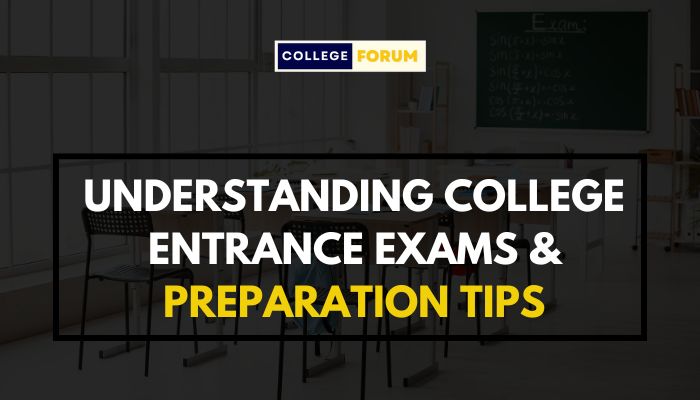Understanding College Entrance Exams & Preparation Tips
College entrance exams play a crucial role in the admissions process, often determining whether a student gains entry into their desired college or university. Proper preparation is essential for achieving high scores and improving chances of admission. This comprehensive guide aims to provide detailed information and actionable tips to help students excel in their entrance exams.
Introduction
College entrance exams are standardized tests designed to evaluate a student’s readiness for college-level work. These exams assess various skills, including critical thinking, problem-solving, and subject-specific knowledge. Understanding the different types of entrance exams and how to prepare for them can significantly impact your performance and college admission prospects.
Section 1: Types of College Entrance Exams
Standardized Tests

Standardized tests are widely recognized and used by many colleges to assess applicants.
- SAT (Scholastic Assessment Test)
- The SAT measures literacy, numeracy, and writing skills.
- It includes sections on Evidence-Based Reading and Writing, Math, and an optional Essay.
- ACT (American College Testing)
- The ACT covers English, Math, Reading, and Science, with an optional Writing section.
- It is designed to measure a student’s readiness for college and provide colleges with a common data point.
Subject-Specific Tests
Subject-specific tests assess knowledge in particular areas of study.
- SAT Subject Tests
- These are subject-specific standardized tests offered in areas like Math, History, and Sciences.
- They provide an opportunity to highlight strengths in particular subjects.
- Advanced Placement (AP) Exams
- AP exams assess understanding of college-level material in various subjects.
- High scores can often earn college credit or advanced placement in college courses.
Specialized Entrance Exams
Specialized entrance exams are required for specific fields of study.
- Medical and Engineering Exams (e.g., NEET, JEE in India)
- NEET (National Eligibility cum Entrance Test) for medical studies.
- JEE (Joint Entrance Examination) for engineering programs.
- These exams are highly competitive and critical for admissions to top institutions.
- Law Entrance Exams (e.g., LSAT)
- LSAT (Law School Admission Test) is essential for law school admissions.
- It focuses on reading comprehension, logical reasoning, and analytical reasoning.
Section 2: Understanding the Structure of Entrance Exams
Format and Sections

Understanding the format and sections of your entrance exam is crucial for effective preparation.
- Multiple Choice Questions
- Common in standardized tests, multiple-choice questions assess a wide range of knowledge and skills.
- Essay Questions
- Some exams include essay sections to evaluate writing skills and the ability to formulate and express complex ideas.
- Practical and Oral Exams
- Particularly in specialized fields, practical and oral exams assess hands-on skills and verbal communication abilities.
Scoring System
Knowing how exams are scored helps in setting realistic goals and understanding performance.
- Raw Scores
- The total number of correct answers, often with no penalty for incorrect answers.
- Scaled Scores
- Raw scores are converted into scaled scores to account for variations in difficulty across different test versions.
- Percentiles
- Percentile ranks show how a student’s performance compares to others, providing context to their score.
Section 3: Preparation Strategies
Early Planning

Starting early is key to effective preparation.
- Setting Goals
- Define clear, achievable goals based on your target scores and the requirements of your chosen colleges.
- Understanding Requirements
- Research the specific requirements and preferred scores of the colleges you are applying to.
Study Schedules
A well-structured study schedule is essential for balanced preparation.
- Creating a Timetable
- Allocate specific times for each subject or section of the exam.
- Ensure consistency by setting daily or weekly study sessions.
- Balancing Schoolwork and Exam Preparation
- Find a balance between regular schoolwork and entrance exam preparation to avoid burnout.
Resources for Preparation
Utilize a variety of resources to enhance your study sessions.
- Textbooks and Guides
- Standard textbooks and specific entrance exam guides provide comprehensive content reviews.
- Online Courses and Tutorials
- Online platforms offer interactive lessons, video tutorials, and practice tests.
- Practice Tests and Previous Papers
- Taking practice tests and reviewing past exam papers help familiarize you with the exam format and question types.
Study Techniques
Effective study techniques can improve retention and understanding.
- Active Learning
- Engage actively with the material through discussions, teaching others, and applying concepts to real-world situations.
- Mnemonic Devices
- Use mnemonic devices to remember complex information and formulas.
- Group Study vs. Solo Study
- Determine whether you benefit more from group study sessions or individual study, and plan accordingly.
Time Management
Efficient time management is crucial during both preparation and the actual exam.
- Prioritizing Topics
- Focus on areas where you are weakest while maintaining strength in other areas.
- Time Allocation per Section
- Practice managing time for each section of the exam to ensure you can complete all questions.
Section 4: Specific Tips for Popular Exams
 SAT Preparation Tips
SAT Preparation Tips
- Critical Reading
- Improve comprehension skills by reading a variety of texts and practicing summarization.
- Math
- Focus on fundamental concepts and practice problem-solving regularly.
- Writing and Language
- Enhance grammar and usage skills through targeted practice.
- Essay (Optional)
- Practice writing essays on various topics and get feedback to improve.
ACT Preparation Tips
- English
- Concentrate on grammar, punctuation, and sentence structure.
- Math
- Practice a wide range of math topics, focusing on speed and accuracy.
- Reading
- Develop quick reading and analytical skills to handle the passage-based questions.
- Science
- Focus on data interpretation, research summaries, and scientific reasoning.
- Writing (Optional)
- Practice essay writing, focusing on clarity, coherence, and argument structure.
NEET Preparation Tips
- Biology
- Focus on understanding concepts and diagrams, and practice frequently.
- Chemistry
- Balance between organic, inorganic, and physical chemistry through regular practice and revision.
- Physics
- Emphasize problem-solving skills and understanding fundamental principles.
JEE Preparation Tips
- Mathematics
- Practice extensively and understand the application of concepts.
- Physics
- Focus on conceptual clarity and numerical problem-solving.
- Chemistry
- Regularly revise and practice both theoretical and practical aspects.
Section 5: Test Day Tips
Last-Minute Revision

Effective revision strategies can help reinforce your preparation.
- Key Points and Formulae
- Review important points and formulas the night before the exam.
- Flashcards
- Use flashcards for quick revision of crucial concepts.
What to Bring
Prepare everything you need to avoid last-minute stress.
- Use flashcards for quick revision of crucial concepts.
- Required Documents
- Ensure you have your admit card, identification, and any other required documents.
- Approved Calculator and Stationery
- Bring necessary tools such as an approved calculator, pens, pencils, and erasers.
Managing Test Anxiety
Stay calm and focused to perform your best.
- Relaxation Techniques
- Practice deep breathing, meditation, or other relaxation techniques to reduce anxiety.
- Positive Visualization
- Visualize yourself succeeding in the exam to build confidence.
Section 6: After the Exam
Understanding Your Scores
Interpret your scores accurately to plan your next steps.
- Score Interpretation
- Understand what your scores mean in terms of your strengths and weaknesses.
- Score Reporting
- Know how and when your scores will be sent to colleges.
Next Steps
Take the right steps post-exam to enhance your college application.
- Application Process
- Complete your college applications with all required documents and test scores.
- Choosing the Right College
- Research and select colleges that best fit your academic goals and career aspirations.
Conclusion
Preparing for college entrance exams requires dedication, strategy, and effective use of resources. By understanding the different types of exams, their structures, and utilizing targeted preparation tips, you can improve your chances of achieving high scores. Remember, college forums are an excellent platform to find the best colleges in Dehradun and gain additional insights into entrance exam preparation. Good luck with your studies and future endeavors!

